University Internship: Assertiveness, Reflection, and Behavior Change
VerifiedAdded on 2023/01/19
|10
|3278
|31
Homework Assignment
AI Summary
This assignment is a comprehensive reflection on a Human Services Internship, detailing the student's experiences and insights gained. The student discusses a specific situation where they employed assertive communication to manage a challenging client interaction, highlighting the importance of respecting boundaries and voicing needs. The reflection also includes self-assessment results, revealing moderate stress levels and areas for professional development, particularly in managing work-related stressors and expressing opinions effectively. Furthermore, the assignment analyzes the behaviors of other individuals in the internship, such as Van and Lea, offering suggestions for improving work habits and interpersonal skills. The student emphasizes the significance of time management, setting boundaries, and utilizing assertive communication to navigate workplace challenges and achieve professional goals, concluding with a reflection on the evaluation process and the lessons learned during the internship. The assignment demonstrates a clear understanding of professional development concepts and the practical application of skills in a real-world setting.
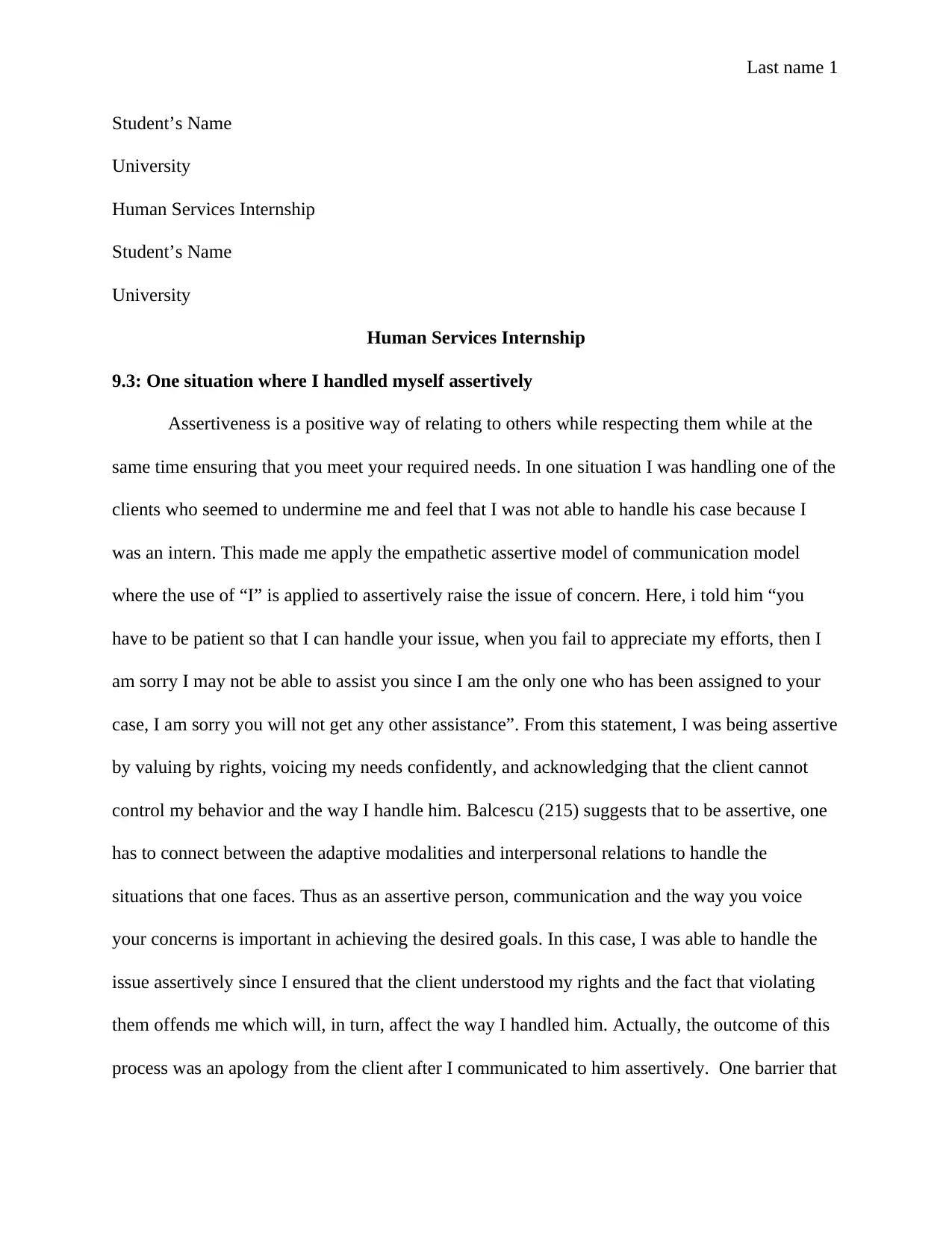
Last name 1
Student’s Name
University
Human Services Internship
Student’s Name
University
Human Services Internship
9.3: One situation where I handled myself assertively
Assertiveness is a positive way of relating to others while respecting them while at the
same time ensuring that you meet your required needs. In one situation I was handling one of the
clients who seemed to undermine me and feel that I was not able to handle his case because I
was an intern. This made me apply the empathetic assertive model of communication model
where the use of “I” is applied to assertively raise the issue of concern. Here, i told him “you
have to be patient so that I can handle your issue, when you fail to appreciate my efforts, then I
am sorry I may not be able to assist you since I am the only one who has been assigned to your
case, I am sorry you will not get any other assistance”. From this statement, I was being assertive
by valuing by rights, voicing my needs confidently, and acknowledging that the client cannot
control my behavior and the way I handle him. Balcescu (215) suggests that to be assertive, one
has to connect between the adaptive modalities and interpersonal relations to handle the
situations that one faces. Thus as an assertive person, communication and the way you voice
your concerns is important in achieving the desired goals. In this case, I was able to handle the
issue assertively since I ensured that the client understood my rights and the fact that violating
them offends me which will, in turn, affect the way I handled him. Actually, the outcome of this
process was an apology from the client after I communicated to him assertively. One barrier that
Student’s Name
University
Human Services Internship
Student’s Name
University
Human Services Internship
9.3: One situation where I handled myself assertively
Assertiveness is a positive way of relating to others while respecting them while at the
same time ensuring that you meet your required needs. In one situation I was handling one of the
clients who seemed to undermine me and feel that I was not able to handle his case because I
was an intern. This made me apply the empathetic assertive model of communication model
where the use of “I” is applied to assertively raise the issue of concern. Here, i told him “you
have to be patient so that I can handle your issue, when you fail to appreciate my efforts, then I
am sorry I may not be able to assist you since I am the only one who has been assigned to your
case, I am sorry you will not get any other assistance”. From this statement, I was being assertive
by valuing by rights, voicing my needs confidently, and acknowledging that the client cannot
control my behavior and the way I handle him. Balcescu (215) suggests that to be assertive, one
has to connect between the adaptive modalities and interpersonal relations to handle the
situations that one faces. Thus as an assertive person, communication and the way you voice
your concerns is important in achieving the desired goals. In this case, I was able to handle the
issue assertively since I ensured that the client understood my rights and the fact that violating
them offends me which will, in turn, affect the way I handled him. Actually, the outcome of this
process was an apology from the client after I communicated to him assertively. One barrier that
Paraphrase This Document
Need a fresh take? Get an instant paraphrase of this document with our AI Paraphraser
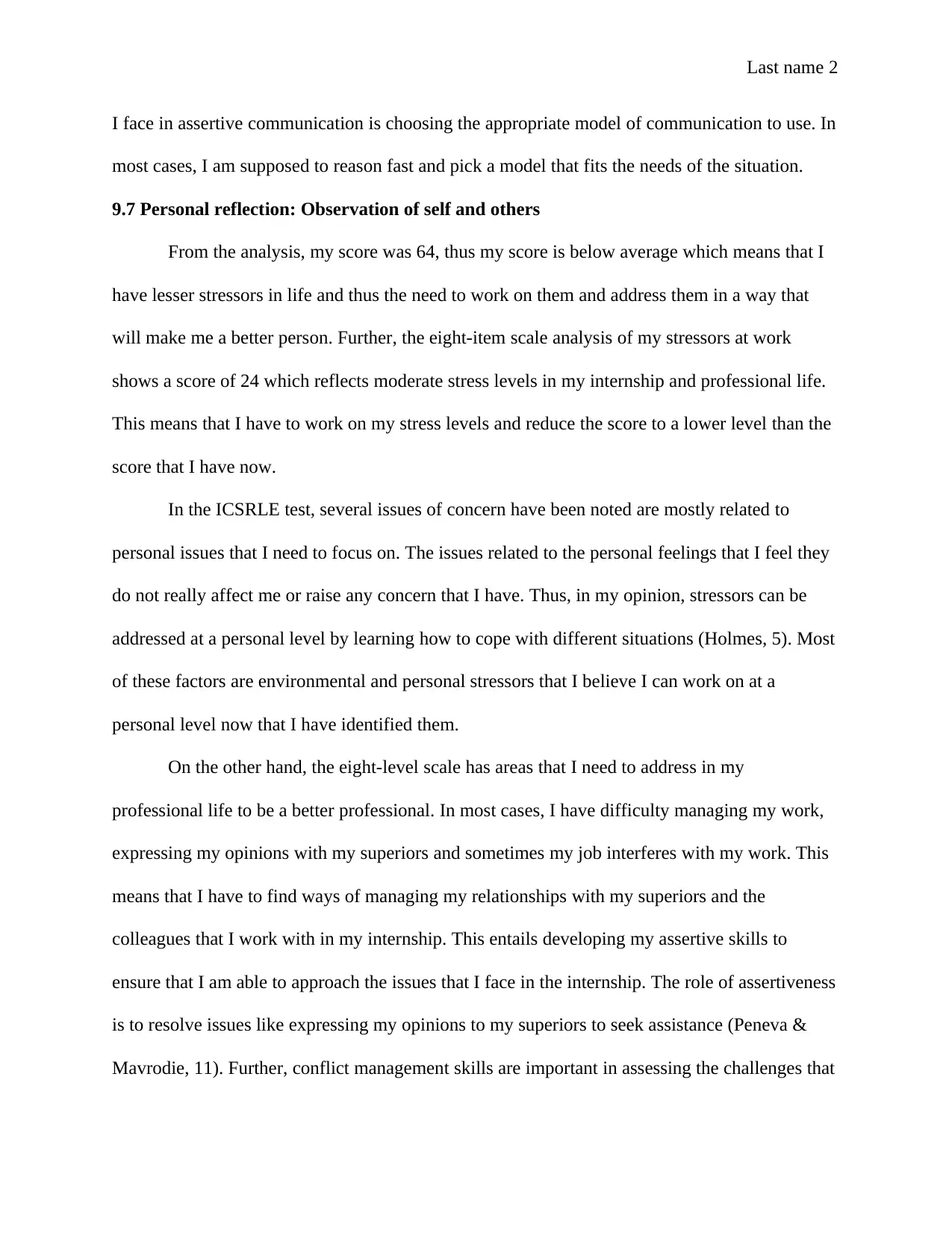
Last name 2
I face in assertive communication is choosing the appropriate model of communication to use. In
most cases, I am supposed to reason fast and pick a model that fits the needs of the situation.
9.7 Personal reflection: Observation of self and others
From the analysis, my score was 64, thus my score is below average which means that I
have lesser stressors in life and thus the need to work on them and address them in a way that
will make me a better person. Further, the eight-item scale analysis of my stressors at work
shows a score of 24 which reflects moderate stress levels in my internship and professional life.
This means that I have to work on my stress levels and reduce the score to a lower level than the
score that I have now.
In the ICSRLE test, several issues of concern have been noted are mostly related to
personal issues that I need to focus on. The issues related to the personal feelings that I feel they
do not really affect me or raise any concern that I have. Thus, in my opinion, stressors can be
addressed at a personal level by learning how to cope with different situations (Holmes, 5). Most
of these factors are environmental and personal stressors that I believe I can work on at a
personal level now that I have identified them.
On the other hand, the eight-level scale has areas that I need to address in my
professional life to be a better professional. In most cases, I have difficulty managing my work,
expressing my opinions with my superiors and sometimes my job interferes with my work. This
means that I have to find ways of managing my relationships with my superiors and the
colleagues that I work with in my internship. This entails developing my assertive skills to
ensure that I am able to approach the issues that I face in the internship. The role of assertiveness
is to resolve issues like expressing my opinions to my superiors to seek assistance (Peneva &
Mavrodie, 11). Further, conflict management skills are important in assessing the challenges that
I face in assertive communication is choosing the appropriate model of communication to use. In
most cases, I am supposed to reason fast and pick a model that fits the needs of the situation.
9.7 Personal reflection: Observation of self and others
From the analysis, my score was 64, thus my score is below average which means that I
have lesser stressors in life and thus the need to work on them and address them in a way that
will make me a better person. Further, the eight-item scale analysis of my stressors at work
shows a score of 24 which reflects moderate stress levels in my internship and professional life.
This means that I have to work on my stress levels and reduce the score to a lower level than the
score that I have now.
In the ICSRLE test, several issues of concern have been noted are mostly related to
personal issues that I need to focus on. The issues related to the personal feelings that I feel they
do not really affect me or raise any concern that I have. Thus, in my opinion, stressors can be
addressed at a personal level by learning how to cope with different situations (Holmes, 5). Most
of these factors are environmental and personal stressors that I believe I can work on at a
personal level now that I have identified them.
On the other hand, the eight-level scale has areas that I need to address in my
professional life to be a better professional. In most cases, I have difficulty managing my work,
expressing my opinions with my superiors and sometimes my job interferes with my work. This
means that I have to find ways of managing my relationships with my superiors and the
colleagues that I work with in my internship. This entails developing my assertive skills to
ensure that I am able to approach the issues that I face in the internship. The role of assertiveness
is to resolve issues like expressing my opinions to my superiors to seek assistance (Peneva &
Mavrodie, 11). Further, conflict management skills are important in assessing the challenges that
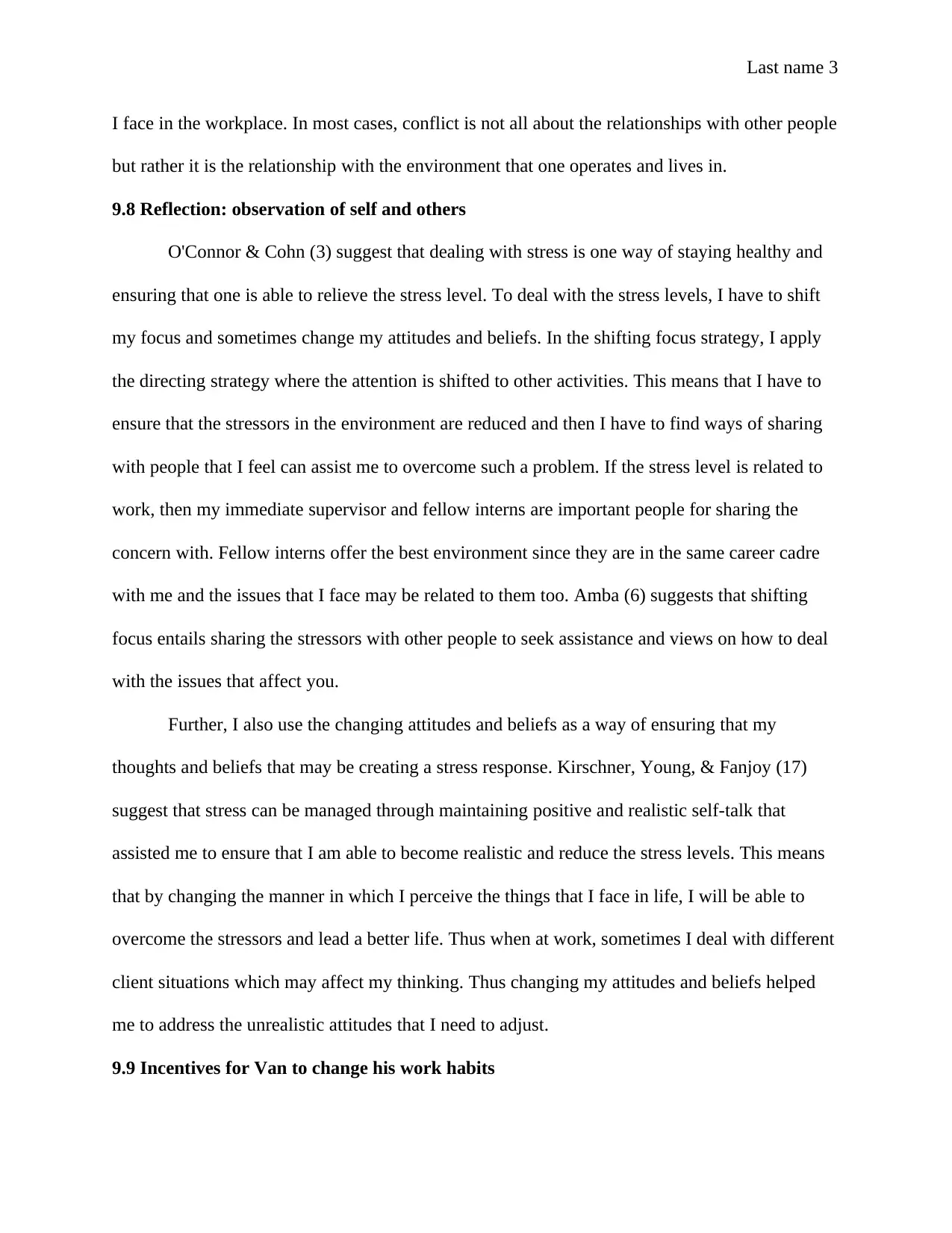
Last name 3
I face in the workplace. In most cases, conflict is not all about the relationships with other people
but rather it is the relationship with the environment that one operates and lives in.
9.8 Reflection: observation of self and others
O'Connor & Cohn (3) suggest that dealing with stress is one way of staying healthy and
ensuring that one is able to relieve the stress level. To deal with the stress levels, I have to shift
my focus and sometimes change my attitudes and beliefs. In the shifting focus strategy, I apply
the directing strategy where the attention is shifted to other activities. This means that I have to
ensure that the stressors in the environment are reduced and then I have to find ways of sharing
with people that I feel can assist me to overcome such a problem. If the stress level is related to
work, then my immediate supervisor and fellow interns are important people for sharing the
concern with. Fellow interns offer the best environment since they are in the same career cadre
with me and the issues that I face may be related to them too. Amba (6) suggests that shifting
focus entails sharing the stressors with other people to seek assistance and views on how to deal
with the issues that affect you.
Further, I also use the changing attitudes and beliefs as a way of ensuring that my
thoughts and beliefs that may be creating a stress response. Kirschner, Young, & Fanjoy (17)
suggest that stress can be managed through maintaining positive and realistic self-talk that
assisted me to ensure that I am able to become realistic and reduce the stress levels. This means
that by changing the manner in which I perceive the things that I face in life, I will be able to
overcome the stressors and lead a better life. Thus when at work, sometimes I deal with different
client situations which may affect my thinking. Thus changing my attitudes and beliefs helped
me to address the unrealistic attitudes that I need to adjust.
9.9 Incentives for Van to change his work habits
I face in the workplace. In most cases, conflict is not all about the relationships with other people
but rather it is the relationship with the environment that one operates and lives in.
9.8 Reflection: observation of self and others
O'Connor & Cohn (3) suggest that dealing with stress is one way of staying healthy and
ensuring that one is able to relieve the stress level. To deal with the stress levels, I have to shift
my focus and sometimes change my attitudes and beliefs. In the shifting focus strategy, I apply
the directing strategy where the attention is shifted to other activities. This means that I have to
ensure that the stressors in the environment are reduced and then I have to find ways of sharing
with people that I feel can assist me to overcome such a problem. If the stress level is related to
work, then my immediate supervisor and fellow interns are important people for sharing the
concern with. Fellow interns offer the best environment since they are in the same career cadre
with me and the issues that I face may be related to them too. Amba (6) suggests that shifting
focus entails sharing the stressors with other people to seek assistance and views on how to deal
with the issues that affect you.
Further, I also use the changing attitudes and beliefs as a way of ensuring that my
thoughts and beliefs that may be creating a stress response. Kirschner, Young, & Fanjoy (17)
suggest that stress can be managed through maintaining positive and realistic self-talk that
assisted me to ensure that I am able to become realistic and reduce the stress levels. This means
that by changing the manner in which I perceive the things that I face in life, I will be able to
overcome the stressors and lead a better life. Thus when at work, sometimes I deal with different
client situations which may affect my thinking. Thus changing my attitudes and beliefs helped
me to address the unrealistic attitudes that I need to adjust.
9.9 Incentives for Van to change his work habits
⊘ This is a preview!⊘
Do you want full access?
Subscribe today to unlock all pages.

Trusted by 1+ million students worldwide
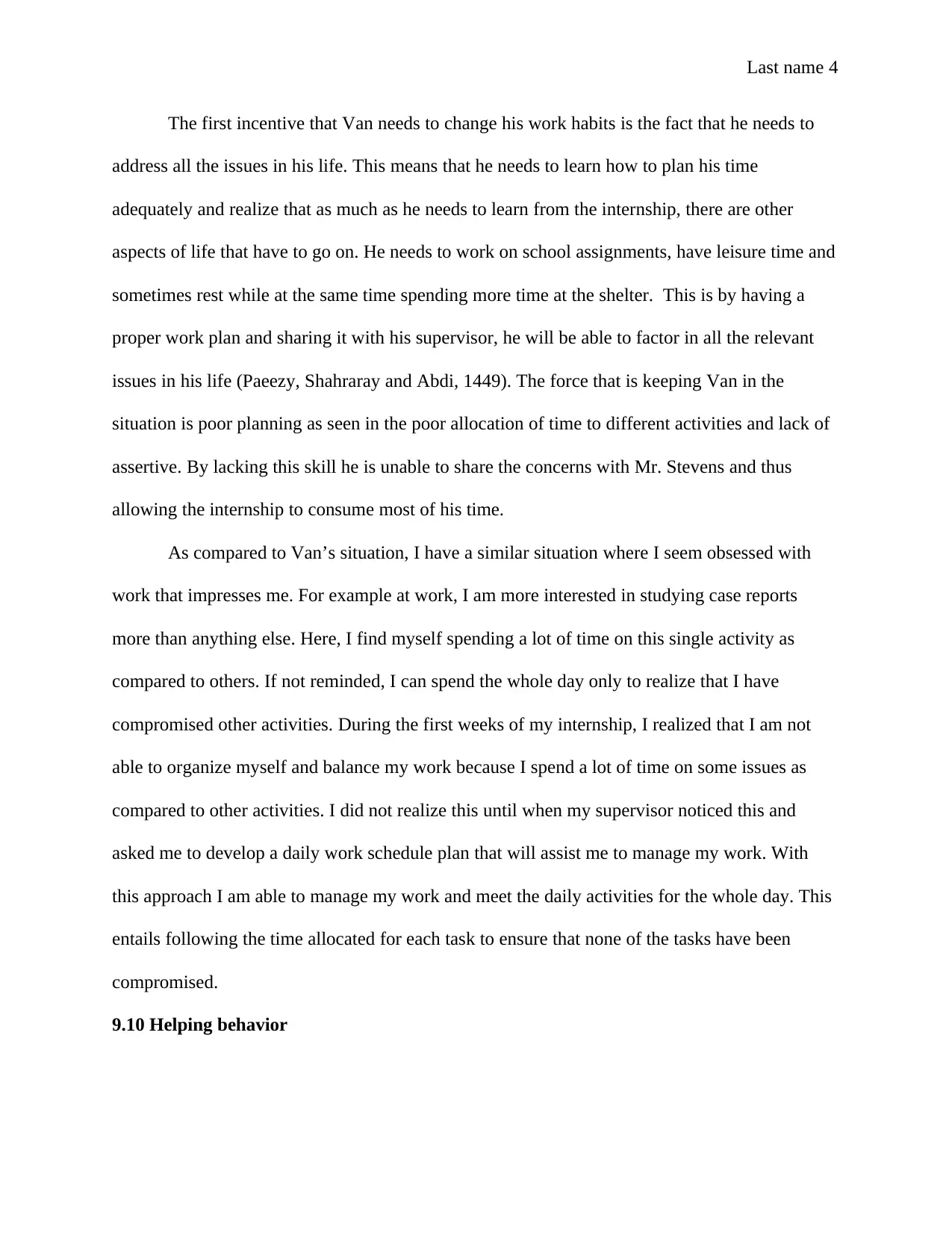
Last name 4
The first incentive that Van needs to change his work habits is the fact that he needs to
address all the issues in his life. This means that he needs to learn how to plan his time
adequately and realize that as much as he needs to learn from the internship, there are other
aspects of life that have to go on. He needs to work on school assignments, have leisure time and
sometimes rest while at the same time spending more time at the shelter. This is by having a
proper work plan and sharing it with his supervisor, he will be able to factor in all the relevant
issues in his life (Paeezy, Shahraray and Abdi, 1449). The force that is keeping Van in the
situation is poor planning as seen in the poor allocation of time to different activities and lack of
assertive. By lacking this skill he is unable to share the concerns with Mr. Stevens and thus
allowing the internship to consume most of his time.
As compared to Van’s situation, I have a similar situation where I seem obsessed with
work that impresses me. For example at work, I am more interested in studying case reports
more than anything else. Here, I find myself spending a lot of time on this single activity as
compared to others. If not reminded, I can spend the whole day only to realize that I have
compromised other activities. During the first weeks of my internship, I realized that I am not
able to organize myself and balance my work because I spend a lot of time on some issues as
compared to other activities. I did not realize this until when my supervisor noticed this and
asked me to develop a daily work schedule plan that will assist me to manage my work. With
this approach I am able to manage my work and meet the daily activities for the whole day. This
entails following the time allocated for each task to ensure that none of the tasks have been
compromised.
9.10 Helping behavior
The first incentive that Van needs to change his work habits is the fact that he needs to
address all the issues in his life. This means that he needs to learn how to plan his time
adequately and realize that as much as he needs to learn from the internship, there are other
aspects of life that have to go on. He needs to work on school assignments, have leisure time and
sometimes rest while at the same time spending more time at the shelter. This is by having a
proper work plan and sharing it with his supervisor, he will be able to factor in all the relevant
issues in his life (Paeezy, Shahraray and Abdi, 1449). The force that is keeping Van in the
situation is poor planning as seen in the poor allocation of time to different activities and lack of
assertive. By lacking this skill he is unable to share the concerns with Mr. Stevens and thus
allowing the internship to consume most of his time.
As compared to Van’s situation, I have a similar situation where I seem obsessed with
work that impresses me. For example at work, I am more interested in studying case reports
more than anything else. Here, I find myself spending a lot of time on this single activity as
compared to others. If not reminded, I can spend the whole day only to realize that I have
compromised other activities. During the first weeks of my internship, I realized that I am not
able to organize myself and balance my work because I spend a lot of time on some issues as
compared to other activities. I did not realize this until when my supervisor noticed this and
asked me to develop a daily work schedule plan that will assist me to manage my work. With
this approach I am able to manage my work and meet the daily activities for the whole day. This
entails following the time allocated for each task to ensure that none of the tasks have been
compromised.
9.10 Helping behavior
Paraphrase This Document
Need a fresh take? Get an instant paraphrase of this document with our AI Paraphraser
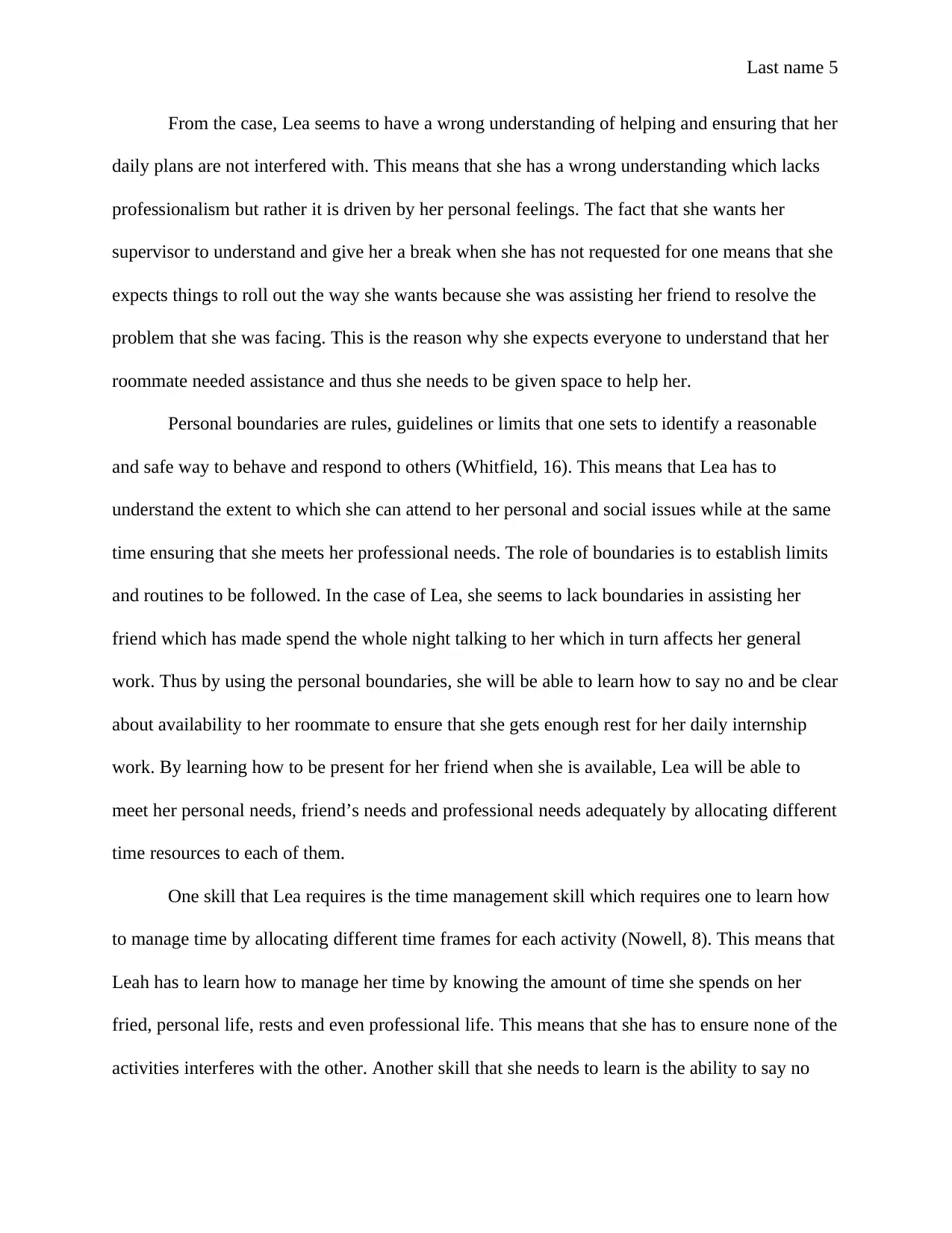
Last name 5
From the case, Lea seems to have a wrong understanding of helping and ensuring that her
daily plans are not interfered with. This means that she has a wrong understanding which lacks
professionalism but rather it is driven by her personal feelings. The fact that she wants her
supervisor to understand and give her a break when she has not requested for one means that she
expects things to roll out the way she wants because she was assisting her friend to resolve the
problem that she was facing. This is the reason why she expects everyone to understand that her
roommate needed assistance and thus she needs to be given space to help her.
Personal boundaries are rules, guidelines or limits that one sets to identify a reasonable
and safe way to behave and respond to others (Whitfield, 16). This means that Lea has to
understand the extent to which she can attend to her personal and social issues while at the same
time ensuring that she meets her professional needs. The role of boundaries is to establish limits
and routines to be followed. In the case of Lea, she seems to lack boundaries in assisting her
friend which has made spend the whole night talking to her which in turn affects her general
work. Thus by using the personal boundaries, she will be able to learn how to say no and be clear
about availability to her roommate to ensure that she gets enough rest for her daily internship
work. By learning how to be present for her friend when she is available, Lea will be able to
meet her personal needs, friend’s needs and professional needs adequately by allocating different
time resources to each of them.
One skill that Lea requires is the time management skill which requires one to learn how
to manage time by allocating different time frames for each activity (Nowell, 8). This means that
Leah has to learn how to manage her time by knowing the amount of time she spends on her
fried, personal life, rests and even professional life. This means that she has to ensure none of the
activities interferes with the other. Another skill that she needs to learn is the ability to say no
From the case, Lea seems to have a wrong understanding of helping and ensuring that her
daily plans are not interfered with. This means that she has a wrong understanding which lacks
professionalism but rather it is driven by her personal feelings. The fact that she wants her
supervisor to understand and give her a break when she has not requested for one means that she
expects things to roll out the way she wants because she was assisting her friend to resolve the
problem that she was facing. This is the reason why she expects everyone to understand that her
roommate needed assistance and thus she needs to be given space to help her.
Personal boundaries are rules, guidelines or limits that one sets to identify a reasonable
and safe way to behave and respond to others (Whitfield, 16). This means that Lea has to
understand the extent to which she can attend to her personal and social issues while at the same
time ensuring that she meets her professional needs. The role of boundaries is to establish limits
and routines to be followed. In the case of Lea, she seems to lack boundaries in assisting her
friend which has made spend the whole night talking to her which in turn affects her general
work. Thus by using the personal boundaries, she will be able to learn how to say no and be clear
about availability to her roommate to ensure that she gets enough rest for her daily internship
work. By learning how to be present for her friend when she is available, Lea will be able to
meet her personal needs, friend’s needs and professional needs adequately by allocating different
time resources to each of them.
One skill that Lea requires is the time management skill which requires one to learn how
to manage time by allocating different time frames for each activity (Nowell, 8). This means that
Leah has to learn how to manage her time by knowing the amount of time she spends on her
fried, personal life, rests and even professional life. This means that she has to ensure none of the
activities interferes with the other. Another skill that she needs to learn is the ability to say no

Last name 6
without guilt. This means that she is supposed to be only there when she is available. Thus once
the time that she has allocated her friend is over, she needs to politely tell her friend that she
needs to rest for the following day’s work.
Lastly, Leah requires the assertiveness skill in communicating and relating with her
friend. This is an attitude of mind and a positive way of relating to others through understanding
personal needs and voicing any concerns that are needed (Milne, 21). This skill is important in
assisting Leah set the boundaries and have enough time for other activities
10.3 Reflection on evaluation
Evaluation is the time when you meet with your supervisor to hear about your strengths
and weaknesses. This is the most difficult time since I did not know the kind of notes that my
supervisor had on me. I have to admit that I was a bit nervous from the fact that my supervisor
was a very strict person who wanted things to be done the way he had recommended. I have to
admit that I was really concerned about the evaluation since to me this seemed like a job
evaluation after probation. The most important message that I heard was being congratulated
about my effort and dedication towards meeting the deadlines of the tasks that I had been
allocated. My supervisor admitted that in the first few weeks is struggled but after some time, I
was able to quickly adapt and work the organizational and professional way. My quick learning
ability was also congratulated since my supervisor noted that I grasped concepts and procedures
quickly which made me work better. To maintain a proper posture, I kept my chin and head up, I
gestured with palms during the evaluation, maintained eye contact and followed by responded by
using verbal and verbal signs to show that I was following.
One thing that I noted from the supervisor is the ability to plan and allocate resources to
all activities by balancing them based on the weight of the activity. Thus the planning element
without guilt. This means that she is supposed to be only there when she is available. Thus once
the time that she has allocated her friend is over, she needs to politely tell her friend that she
needs to rest for the following day’s work.
Lastly, Leah requires the assertiveness skill in communicating and relating with her
friend. This is an attitude of mind and a positive way of relating to others through understanding
personal needs and voicing any concerns that are needed (Milne, 21). This skill is important in
assisting Leah set the boundaries and have enough time for other activities
10.3 Reflection on evaluation
Evaluation is the time when you meet with your supervisor to hear about your strengths
and weaknesses. This is the most difficult time since I did not know the kind of notes that my
supervisor had on me. I have to admit that I was a bit nervous from the fact that my supervisor
was a very strict person who wanted things to be done the way he had recommended. I have to
admit that I was really concerned about the evaluation since to me this seemed like a job
evaluation after probation. The most important message that I heard was being congratulated
about my effort and dedication towards meeting the deadlines of the tasks that I had been
allocated. My supervisor admitted that in the first few weeks is struggled but after some time, I
was able to quickly adapt and work the organizational and professional way. My quick learning
ability was also congratulated since my supervisor noted that I grasped concepts and procedures
quickly which made me work better. To maintain a proper posture, I kept my chin and head up, I
gestured with palms during the evaluation, maintained eye contact and followed by responded by
using verbal and verbal signs to show that I was following.
One thing that I noted from the supervisor is the ability to plan and allocate resources to
all activities by balancing them based on the weight of the activity. Thus the planning element
⊘ This is a preview!⊘
Do you want full access?
Subscribe today to unlock all pages.

Trusted by 1+ million students worldwide
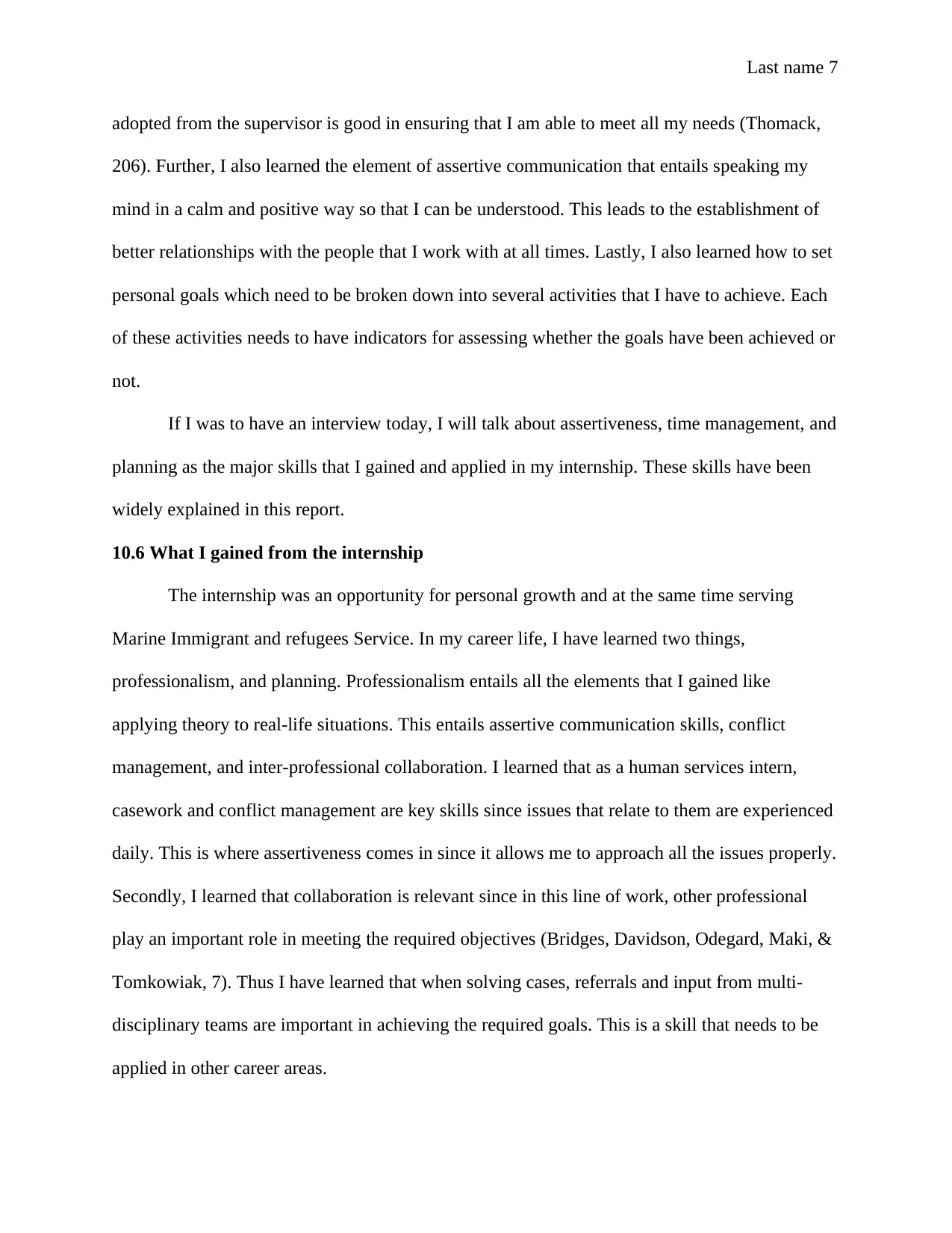
Last name 7
adopted from the supervisor is good in ensuring that I am able to meet all my needs (Thomack,
206). Further, I also learned the element of assertive communication that entails speaking my
mind in a calm and positive way so that I can be understood. This leads to the establishment of
better relationships with the people that I work with at all times. Lastly, I also learned how to set
personal goals which need to be broken down into several activities that I have to achieve. Each
of these activities needs to have indicators for assessing whether the goals have been achieved or
not.
If I was to have an interview today, I will talk about assertiveness, time management, and
planning as the major skills that I gained and applied in my internship. These skills have been
widely explained in this report.
10.6 What I gained from the internship
The internship was an opportunity for personal growth and at the same time serving
Marine Immigrant and refugees Service. In my career life, I have learned two things,
professionalism, and planning. Professionalism entails all the elements that I gained like
applying theory to real-life situations. This entails assertive communication skills, conflict
management, and inter-professional collaboration. I learned that as a human services intern,
casework and conflict management are key skills since issues that relate to them are experienced
daily. This is where assertiveness comes in since it allows me to approach all the issues properly.
Secondly, I learned that collaboration is relevant since in this line of work, other professional
play an important role in meeting the required objectives (Bridges, Davidson, Odegard, Maki, &
Tomkowiak, 7). Thus I have learned that when solving cases, referrals and input from multi-
disciplinary teams are important in achieving the required goals. This is a skill that needs to be
applied in other career areas.
adopted from the supervisor is good in ensuring that I am able to meet all my needs (Thomack,
206). Further, I also learned the element of assertive communication that entails speaking my
mind in a calm and positive way so that I can be understood. This leads to the establishment of
better relationships with the people that I work with at all times. Lastly, I also learned how to set
personal goals which need to be broken down into several activities that I have to achieve. Each
of these activities needs to have indicators for assessing whether the goals have been achieved or
not.
If I was to have an interview today, I will talk about assertiveness, time management, and
planning as the major skills that I gained and applied in my internship. These skills have been
widely explained in this report.
10.6 What I gained from the internship
The internship was an opportunity for personal growth and at the same time serving
Marine Immigrant and refugees Service. In my career life, I have learned two things,
professionalism, and planning. Professionalism entails all the elements that I gained like
applying theory to real-life situations. This entails assertive communication skills, conflict
management, and inter-professional collaboration. I learned that as a human services intern,
casework and conflict management are key skills since issues that relate to them are experienced
daily. This is where assertiveness comes in since it allows me to approach all the issues properly.
Secondly, I learned that collaboration is relevant since in this line of work, other professional
play an important role in meeting the required objectives (Bridges, Davidson, Odegard, Maki, &
Tomkowiak, 7). Thus I have learned that when solving cases, referrals and input from multi-
disciplinary teams are important in achieving the required goals. This is a skill that needs to be
applied in other career areas.
Paraphrase This Document
Need a fresh take? Get an instant paraphrase of this document with our AI Paraphraser
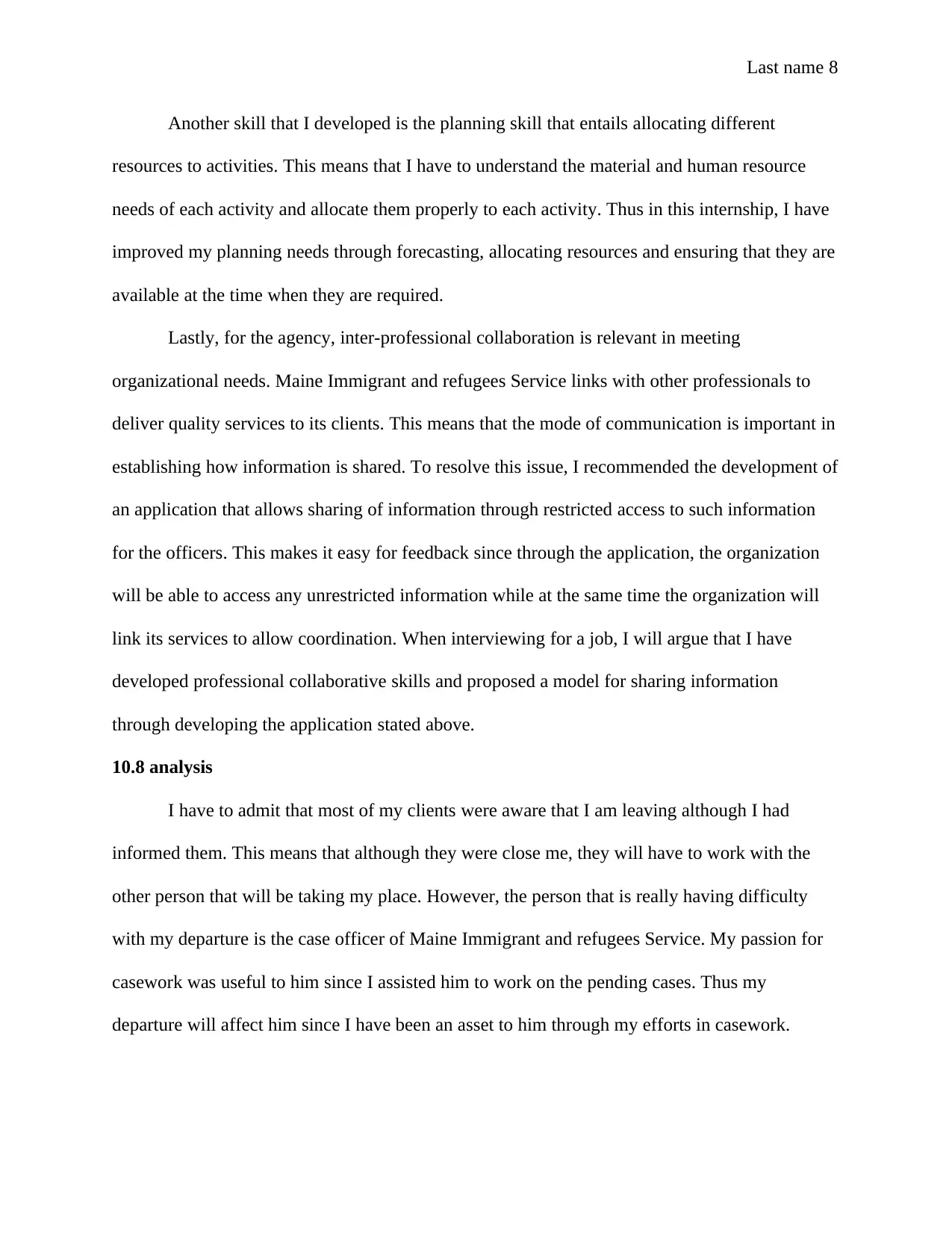
Last name 8
Another skill that I developed is the planning skill that entails allocating different
resources to activities. This means that I have to understand the material and human resource
needs of each activity and allocate them properly to each activity. Thus in this internship, I have
improved my planning needs through forecasting, allocating resources and ensuring that they are
available at the time when they are required.
Lastly, for the agency, inter-professional collaboration is relevant in meeting
organizational needs. Maine Immigrant and refugees Service links with other professionals to
deliver quality services to its clients. This means that the mode of communication is important in
establishing how information is shared. To resolve this issue, I recommended the development of
an application that allows sharing of information through restricted access to such information
for the officers. This makes it easy for feedback since through the application, the organization
will be able to access any unrestricted information while at the same time the organization will
link its services to allow coordination. When interviewing for a job, I will argue that I have
developed professional collaborative skills and proposed a model for sharing information
through developing the application stated above.
10.8 analysis
I have to admit that most of my clients were aware that I am leaving although I had
informed them. This means that although they were close me, they will have to work with the
other person that will be taking my place. However, the person that is really having difficulty
with my departure is the case officer of Maine Immigrant and refugees Service. My passion for
casework was useful to him since I assisted him to work on the pending cases. Thus my
departure will affect him since I have been an asset to him through my efforts in casework.
Another skill that I developed is the planning skill that entails allocating different
resources to activities. This means that I have to understand the material and human resource
needs of each activity and allocate them properly to each activity. Thus in this internship, I have
improved my planning needs through forecasting, allocating resources and ensuring that they are
available at the time when they are required.
Lastly, for the agency, inter-professional collaboration is relevant in meeting
organizational needs. Maine Immigrant and refugees Service links with other professionals to
deliver quality services to its clients. This means that the mode of communication is important in
establishing how information is shared. To resolve this issue, I recommended the development of
an application that allows sharing of information through restricted access to such information
for the officers. This makes it easy for feedback since through the application, the organization
will be able to access any unrestricted information while at the same time the organization will
link its services to allow coordination. When interviewing for a job, I will argue that I have
developed professional collaborative skills and proposed a model for sharing information
through developing the application stated above.
10.8 analysis
I have to admit that most of my clients were aware that I am leaving although I had
informed them. This means that although they were close me, they will have to work with the
other person that will be taking my place. However, the person that is really having difficulty
with my departure is the case officer of Maine Immigrant and refugees Service. My passion for
casework was useful to him since I assisted him to work on the pending cases. Thus my
departure will affect him since I have been an asset to him through my efforts in casework.
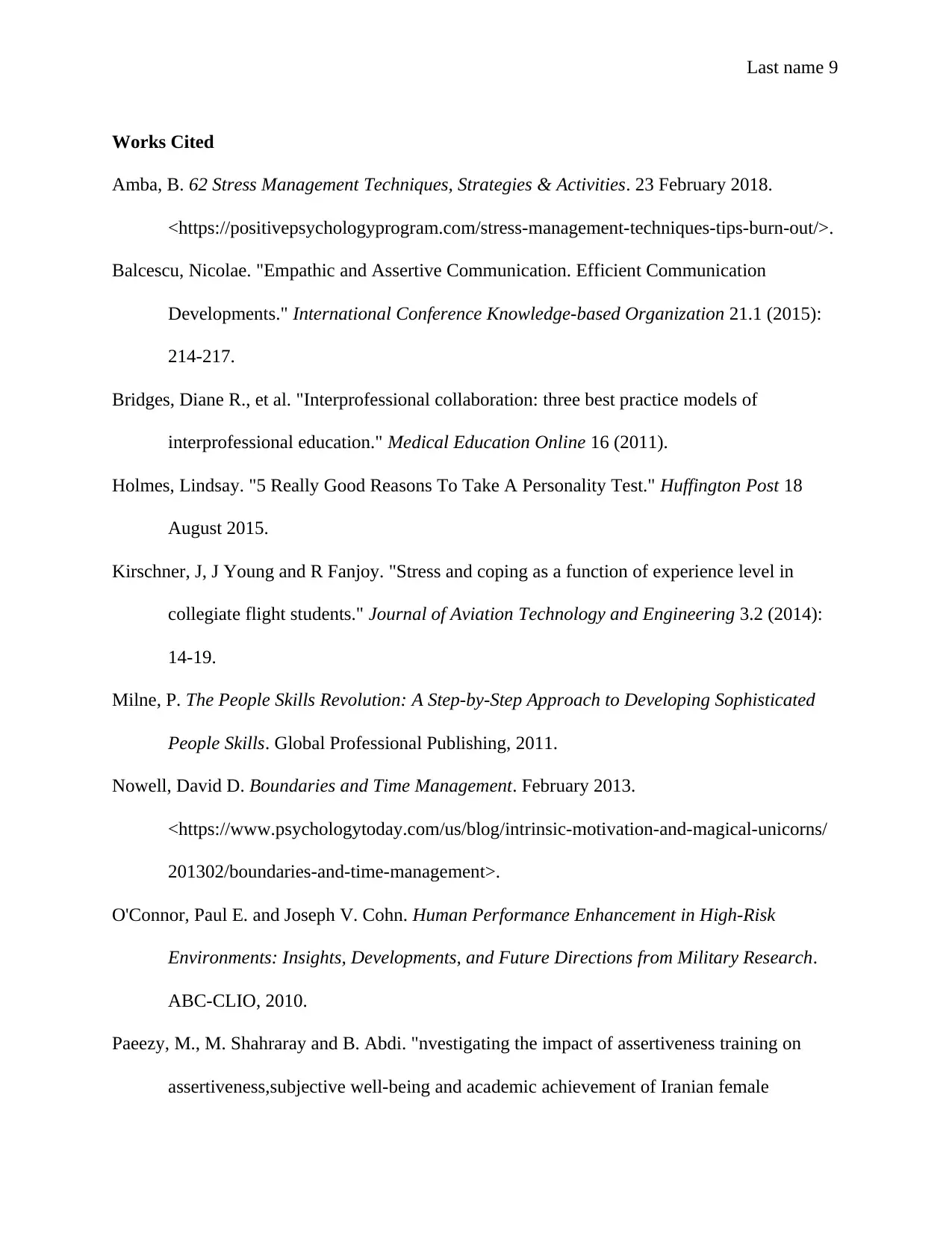
Last name 9
Works Cited
Amba, B. 62 Stress Management Techniques, Strategies & Activities. 23 February 2018.
<https://positivepsychologyprogram.com/stress-management-techniques-tips-burn-out/>.
Balcescu, Nicolae. "Empathic and Assertive Communication. Efficient Communication
Developments." International Conference Knowledge-based Organization 21.1 (2015):
214-217.
Bridges, Diane R., et al. "Interprofessional collaboration: three best practice models of
interprofessional education." Medical Education Online 16 (2011).
Holmes, Lindsay. "5 Really Good Reasons To Take A Personality Test." Huffington Post 18
August 2015.
Kirschner, J, J Young and R Fanjoy. "Stress and coping as a function of experience level in
collegiate flight students." Journal of Aviation Technology and Engineering 3.2 (2014):
14-19.
Milne, P. The People Skills Revolution: A Step-by-Step Approach to Developing Sophisticated
People Skills. Global Professional Publishing, 2011.
Nowell, David D. Boundaries and Time Management. February 2013.
<https://www.psychologytoday.com/us/blog/intrinsic-motivation-and-magical-unicorns/
201302/boundaries-and-time-management>.
O'Connor, Paul E. and Joseph V. Cohn. Human Performance Enhancement in High-Risk
Environments: Insights, Developments, and Future Directions from Military Research.
ABC-CLIO, 2010.
Paeezy, M., M. Shahraray and B. Abdi. "nvestigating the impact of assertiveness training on
assertiveness,subjective well-being and academic achievement of Iranian female
Works Cited
Amba, B. 62 Stress Management Techniques, Strategies & Activities. 23 February 2018.
<https://positivepsychologyprogram.com/stress-management-techniques-tips-burn-out/>.
Balcescu, Nicolae. "Empathic and Assertive Communication. Efficient Communication
Developments." International Conference Knowledge-based Organization 21.1 (2015):
214-217.
Bridges, Diane R., et al. "Interprofessional collaboration: three best practice models of
interprofessional education." Medical Education Online 16 (2011).
Holmes, Lindsay. "5 Really Good Reasons To Take A Personality Test." Huffington Post 18
August 2015.
Kirschner, J, J Young and R Fanjoy. "Stress and coping as a function of experience level in
collegiate flight students." Journal of Aviation Technology and Engineering 3.2 (2014):
14-19.
Milne, P. The People Skills Revolution: A Step-by-Step Approach to Developing Sophisticated
People Skills. Global Professional Publishing, 2011.
Nowell, David D. Boundaries and Time Management. February 2013.
<https://www.psychologytoday.com/us/blog/intrinsic-motivation-and-magical-unicorns/
201302/boundaries-and-time-management>.
O'Connor, Paul E. and Joseph V. Cohn. Human Performance Enhancement in High-Risk
Environments: Insights, Developments, and Future Directions from Military Research.
ABC-CLIO, 2010.
Paeezy, M., M. Shahraray and B. Abdi. "nvestigating the impact of assertiveness training on
assertiveness,subjective well-being and academic achievement of Iranian female
⊘ This is a preview!⊘
Do you want full access?
Subscribe today to unlock all pages.

Trusted by 1+ million students worldwide
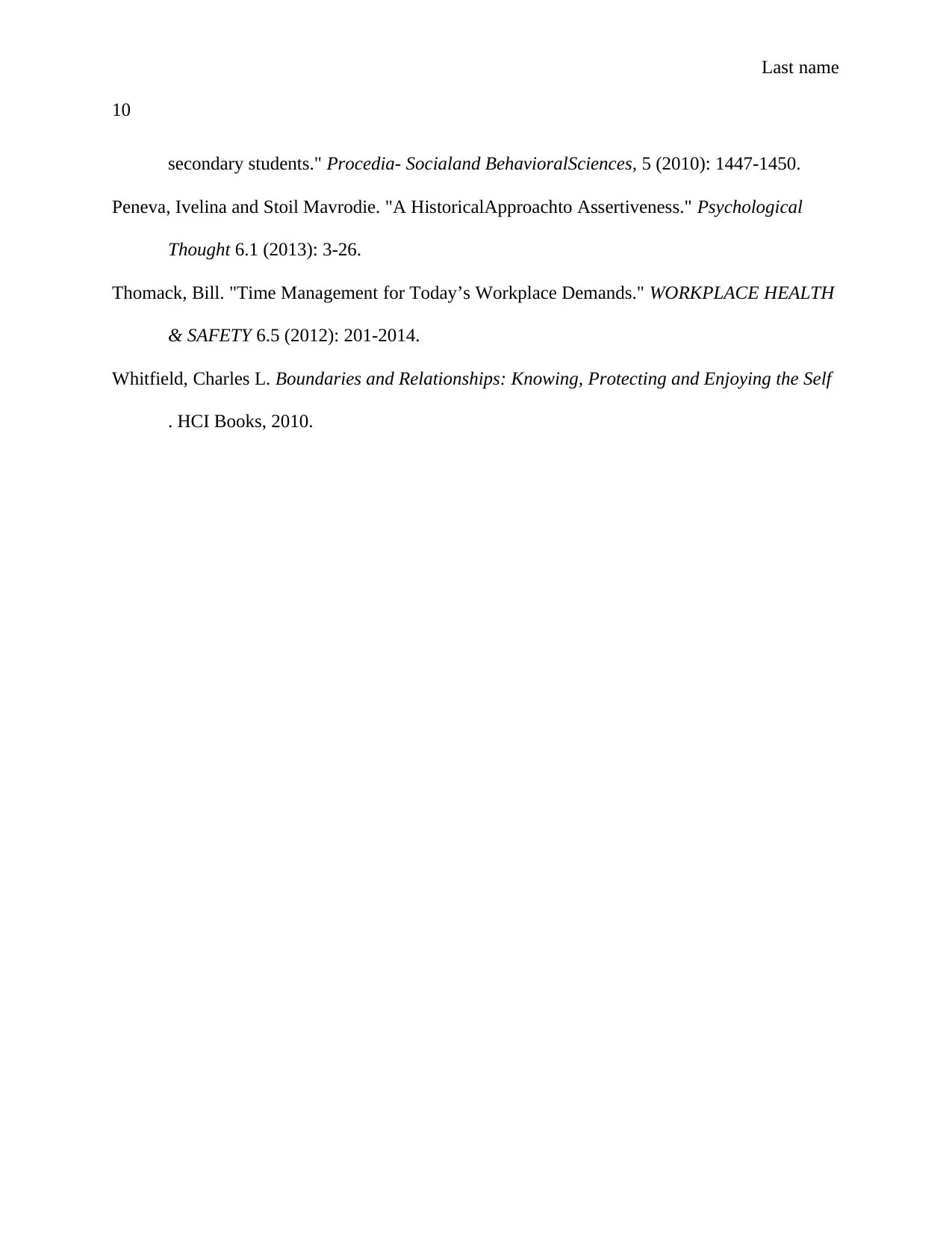
Last name
10
secondary students." Procedia- Socialand BehavioralSciences, 5 (2010): 1447-1450.
Peneva, Ivelina and Stoil Mavrodie. "A HistoricalApproachto Assertiveness." Psychological
Thought 6.1 (2013): 3-26.
Thomack, Bill. "Time Management for Today’s Workplace Demands." WORKPLACE HEALTH
& SAFETY 6.5 (2012): 201-2014.
Whitfield, Charles L. Boundaries and Relationships: Knowing, Protecting and Enjoying the Self
. HCI Books, 2010.
10
secondary students." Procedia- Socialand BehavioralSciences, 5 (2010): 1447-1450.
Peneva, Ivelina and Stoil Mavrodie. "A HistoricalApproachto Assertiveness." Psychological
Thought 6.1 (2013): 3-26.
Thomack, Bill. "Time Management for Today’s Workplace Demands." WORKPLACE HEALTH
& SAFETY 6.5 (2012): 201-2014.
Whitfield, Charles L. Boundaries and Relationships: Knowing, Protecting and Enjoying the Self
. HCI Books, 2010.
1 out of 10
Related Documents
Your All-in-One AI-Powered Toolkit for Academic Success.
+13062052269
info@desklib.com
Available 24*7 on WhatsApp / Email
![[object Object]](/_next/static/media/star-bottom.7253800d.svg)
Unlock your academic potential
Copyright © 2020–2026 A2Z Services. All Rights Reserved. Developed and managed by ZUCOL.





